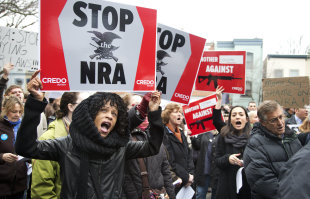PESHAWAR, Pakistan (AP) — The United Nations suspended its polio vaccination drive in Pakistan on Wednesday after eight people involved in the effort were shot dead in the past two days, a U.N. official said.
The suspension was a grave blow to the drive to bring an end to the scourge of polio in Pakistan, one of only three countries where the crippling disease still survives.
On Wednesday, gunmen shot at a woman working on the campaign in northwest Pakistan, killing her and her driver, one of five attacks during the day on polio workers. A male polio immunization worker was critically wounded in one of the shootings.
This week six other people have been killed who were working on the immunization program, which has been jointly conducted with the Pakistani government. No one has claimed responsibility, but some Islamic extremists charge that the program is a cover for espionage.
At the U.N., Secretary-General Ban Ki-moon condemned the killing as "cruel, senseless and inexcusable." He said the eight workers were among thousands across Pakistan "working selflessly to achieve the historic goal of polio eradication."
Sarah Crowe, spokeswoman for UNICEF, said the vaccination program has been suspended everywhere in Pakistan until an investigation by the Pakistani government is completed.
"This is undoubtedly a tragic setback, but the campaign to eradicate polio will and must continue," she said.
Some provincial governments in Pakistan continued to immunize children, independent of the U.N. drive.
Prevention efforts have managed to reduce the number of cases in Pakistan by around 70 percent this year compared to 2011, but the recent violence threatens to reverse that progress.
Suspicion for the attacks has fallen on the Pakistani Taliban because of their virulent opposition to the polio campaign, but the group's spokesman, Ahsanullah Ahsan, denied responsibility in a telephone call to The Associated Press. Police say they have killed two militant suspects and arrested a dozen others in connection to the attacks but did not say whether they were Taliban.
Militants accuse health workers of acting as spies for the U.S. and claim the vaccine makes children sterile. Taliban commanders in the troubled northwest tribal region have also said vaccinations can't go forward until the U.S. stops drone strikes in the country.
Insurgent opposition to the campaign grew last year after it was revealed that a Pakistani doctor ran a fake vaccination program to help the CIA track down and kill al-Qaida founder Osama bin Laden, who was hiding in the town of Abbottabad in the country's northwest.
The number of attacks this week on polio workers is unprecedented. They came as the government started a three-day vaccination drive Monday targeting high risk areas of the country, part of an effort to immunize millions of children under the age of five.
The deadliest of Wednesday's attacks occurred in the northwestern town of Charsadda, where the female polio worker and her driver were gunned down, said senior government official Syed Zafar Ali Shah. Gunmen attacked two other polio immunization teams in Charsadda and one in the town of Nowshera, but no one was hurt in those attacks, he said.
Earlier in the day, gunmen shot a polio worker in the head in the city of Peshawar, wounding him critically, said Janbaz Afridi, a senior health official in surrounding Khyber Pakhtunkhwa province.
On Tuesday, gunmen killed five female polio workers — three of them teenagers — in a series of attacks in Karachi, the capital of southern Sindh province, and a village outside Peshawar. Two men who were working alongside the women were critically wounded in those attacks. A male polio worker was also shot to death in Karachi on Monday.
Police conducted two operations in Karachi in the wake of the shootings in which they arrested a dozen suspects and killed two suspected militants, said senior police official Shahid Hayat.
Several dozen polio immunization workers and human rights activists protested against the killings in Pakistan's capital, Islamabad, on Wednesday and demanded security for the field staff.
The Pakistani government also condemned the attacks, saying they deprive Pakistan's most vulnerable populations — specifically children — of basic life-saving health interventions. The U.N. said it was increasing security for its polio workers, but did not provide any details.
Polio usually infects children living in unsanitary conditions, attacks the nerves and can kill or paralyze. A total of 56 polio cases have been reported in Pakistan during 2012, down from 190 the previous year, according to the U.N. Most of the new cases in Pakistan are in the northwest, where the presence of militants makes it difficult to reach children.
The new campaign aimed to give oral polio prevention drops to 34 million children under the age of five. Clerics and tribal elders were recruited to support polio vaccinations in an attempt to open up areas previously inaccessible to health workers.
____
Associated Press writer Rasool Dawar in Peshawar, Pakistan, and Adil Jawad in Karachi, Pakistan, contributed to this report.











